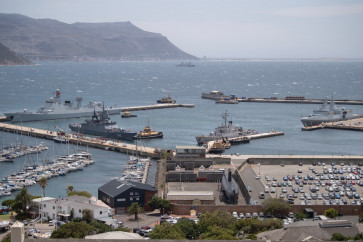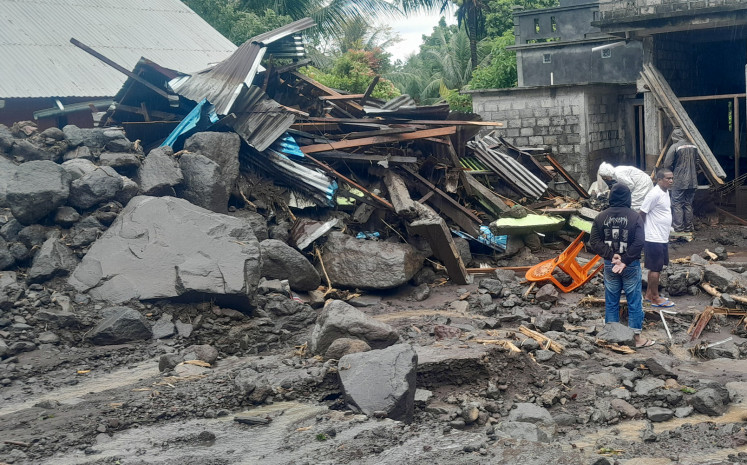Popular Reads
Top Results
Can't find what you're looking for?
View all search resultsPopular Reads
Top Results
Can't find what you're looking for?
View all search resultsRI, S'pore discuss military training, airspace control
Good neighbors: President Joko “Jokowi” Widodo (center) inspects the guard of honor with Singaporean Prime Minister Lee Hsien Loong (third left) at the Istana in Singapore on Tuesday
Change text size
Gift Premium Articles
to Anyone
G
ood neighbors: President Joko “Jokowi” Widodo (center) inspects the guard of honor with Singaporean Prime Minister Lee Hsien Loong (third left) at the Istana in Singapore on Tuesday.(Reuters/Feline Lim)
Indonesia and Singapore have started talks on airspace management and an agreement on military training, two issues that would be negotiated “separately but concurrently”, the leaders of the two countries have said, amid concerns Indonesia might be looking at a bad deal.
President Joko “Jokowi” Widodo was in Singapore on Tuesday for an annual leaders retreat with Prime Minister Lee Hsien Loong, where they raised various bilateral issues including the management of the flight information region (FIR) above Riau Islands province.
An FIR is a specified region of airspace in which flight information and alert services (ALRS) are provided. FIRs above Batam, Tanjung Pinang, Karimun and some parts of the Natuna islands are controlled by Singapore’s Changi Airport.
Lee said as the relations between the two countries had warmed up, it was time to work on some long-standing issues.
“Two such issues are airspace management, specifically the status of the FIR, and secondly military training in accordance with the UN Convention on the Law of the Sea [UNCLOS],” Lee said during his joint press conference with Jokowi on Tuesday, which was broadcast on regional news networks.
“This framework acknowledges that the core interest and the rights of both countries must be recognized and respected, and Indonesia and Singapore should negotiate the agreements on these two issues that are durable and for the long haul,” he said.
“The framework offers a sound and comprehensive basis to work out solutions to these two issues separately but concurrently.”
The Singaporean leader said that he and Jokowi had instructed their respective cabinets to follow up on the technical details of the negotiations and conclude the agreements in a timely manner.
The arrangement first emerged in a letter dated Sept. 18 by Coordinating Maritime Affairs Minister Luhut Pandjaitan, who ordered the transportation and defense ministries to set up technical meetings with their Singaporean counterparts, a copy of which was obtained by The Jakarta Post.
The framework says, among other things, that Indonesia and Singapore are committed to reaching an agreement on FIRs and on military training in the South China Sea. It also states that both countries recognize that "FIRs are not about sovereignty but the safety and efficiency of air traffic" and acknowledge that "military training in the South China Sea is governed by Article 51 of the 1982 [UNCLOS]", which requires archipelagic states to respect existing agreements with other nations.
It also shows the negotiating positions of the two sides. Indonesia wants Singapore to respect "Indonesia’s sovereignty over its territory, including its territorial waters, archipelagic waters and its airspace" and “to understand Indonesia’s strong desire to align the FIR in a timely manner, which corresponds to its territorial sovereignty”. Singapore, meanwhile, requires Indonesia "to fully respect and recognize Singapore’s rights to conduct military training in the South China Sea in accordance with Article 51" and to understand that Singapore’s interests include the present and future requirements for Changi Airport.
Jokowi said Indonesia welcomed the framework for negotiation that was agreed by the two countries. “Indonesia respects the position of Singapore, which understands Indonesia's wish to oversee its own airspace. Our technical team has started negotiations, we encourage the negotiations to speedily achieve concrete results,” he said.
But aviation experts, such as Supri Abu, said that from the letter it looked as if Indonesia was negotiating to take over the FIR but in return Singapore would get its military training area, even though the area was in Indonesia’s territory.
“This is not something that can be dealt with at a ministerial level and it must be approved by the House of Representatives because the 2000 law on international treaties stipulates that anything related to defense and territory must be discussed with the House,” said Supri, who previously worked for the Air Force's legal division.
He said the framework was very surprising, given that bilateral agreements on military training areas had either long expired or had yet to be ratified. Supri referred to the Defense Cooperation Agreement (DCA), which was signed by the two countries in 2007 to amend the already expired Military Training Area (MTA) agreement, but had yet to be ratified by the House.
The Indonesian Military, therefore, has argued that military areas in the DCA are still in Indonesian territory and its military aircraft passing through the DCA have no obligation to report to Singapore.
Indonesian officials have said efforts to take over control of FIRs had nothing to do with sovereignty but was rather a matter of traffic management, in line with the International Civil Aviation Organization's (ICAO) constitution, which allows delegation of air navigation to another country and with no derogation of sovereignty.
However, the arrangement with Singapore deprives Indonesia of authority over the airspace. As a consequence, patrols conducted by the Air Force and Navy in the territory must also seek guidance from Singapore.










